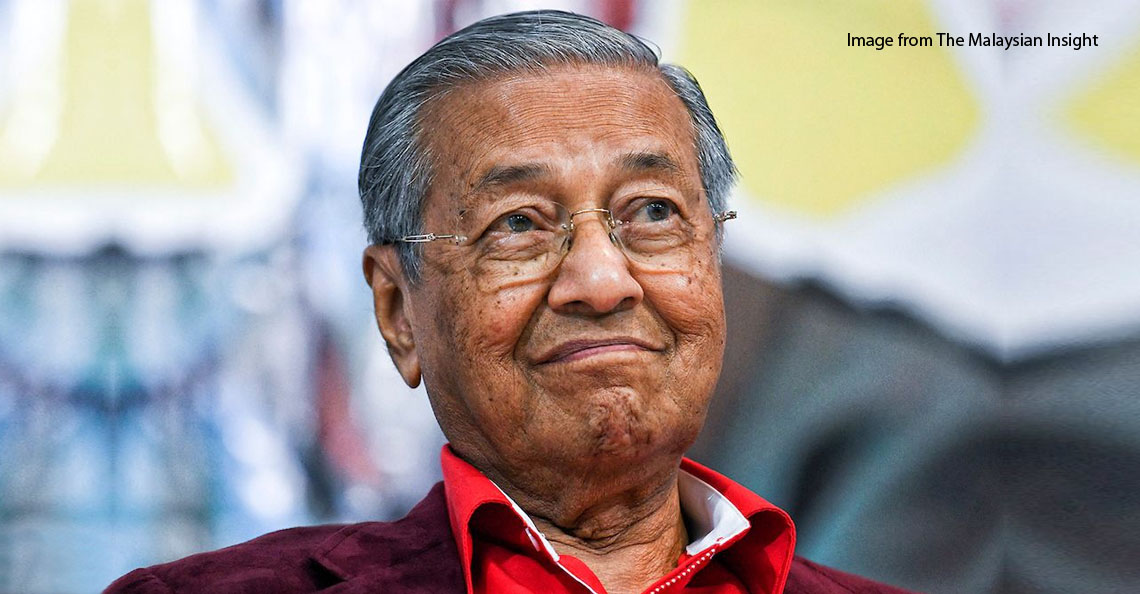Tun Daim: From Finance Minister to corrupt allegations
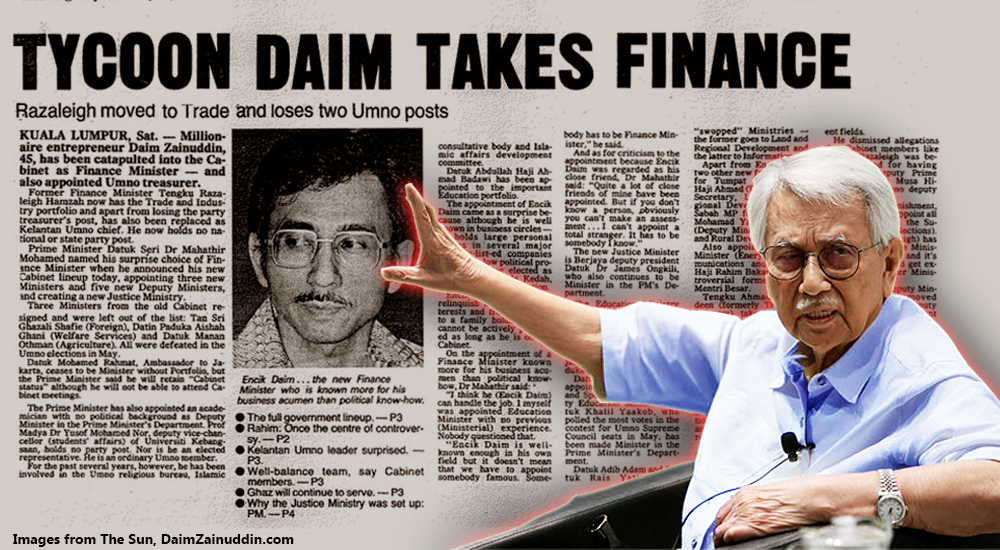
- 295Shares
- Facebook204
- Twitter13
- LinkedIn13
- Email10
- WhatsApp55
[UPDATE 29/1/24]: With all the hoo-ha about how much he’s worth, you would expect the list of Tun Daim’s assets to be pretty extensive. Just maybe not… to this extent. In court today, he was charged with failure to declare a whopping 71 assets 😱. Like his wife though, he’s pleaded not guilty and will await trial.
[UPDATE 23/1/24]: And the saga continues, except it’s Tun Daim’s wife who’s been taken to court. Toh Puan Na’imah has been charged with failure to declare her assets. These assets include 2 companies, 2 cars and 8 properties located within KL and Penang.
In 2021, about 12 million docs, famously called the Pandora Papers, leaked all the corrupt and dodgy dealings of the worldwide elite. Skip to early 2023, and news came out pinpointing at least 10 Malaysians in the mix. It was all very hush-hush, with gossip and accusations flying around until December 2023 when smack before the new year, MACC shocked the whole of Malaysia by seizing Ilham Tower.
Now, Ilham Tower isn’t your run-of-the-mill building. Standing at 60 stories tall in downtown KL and valued at around RM 2 billion, it’s actually the 8th tallest building in Malaysia. And who might this grand building belong to, you ask? Why, none other than our 2-time ex-Finance Minister and revered businessman, Tun Daim Zainuddin.
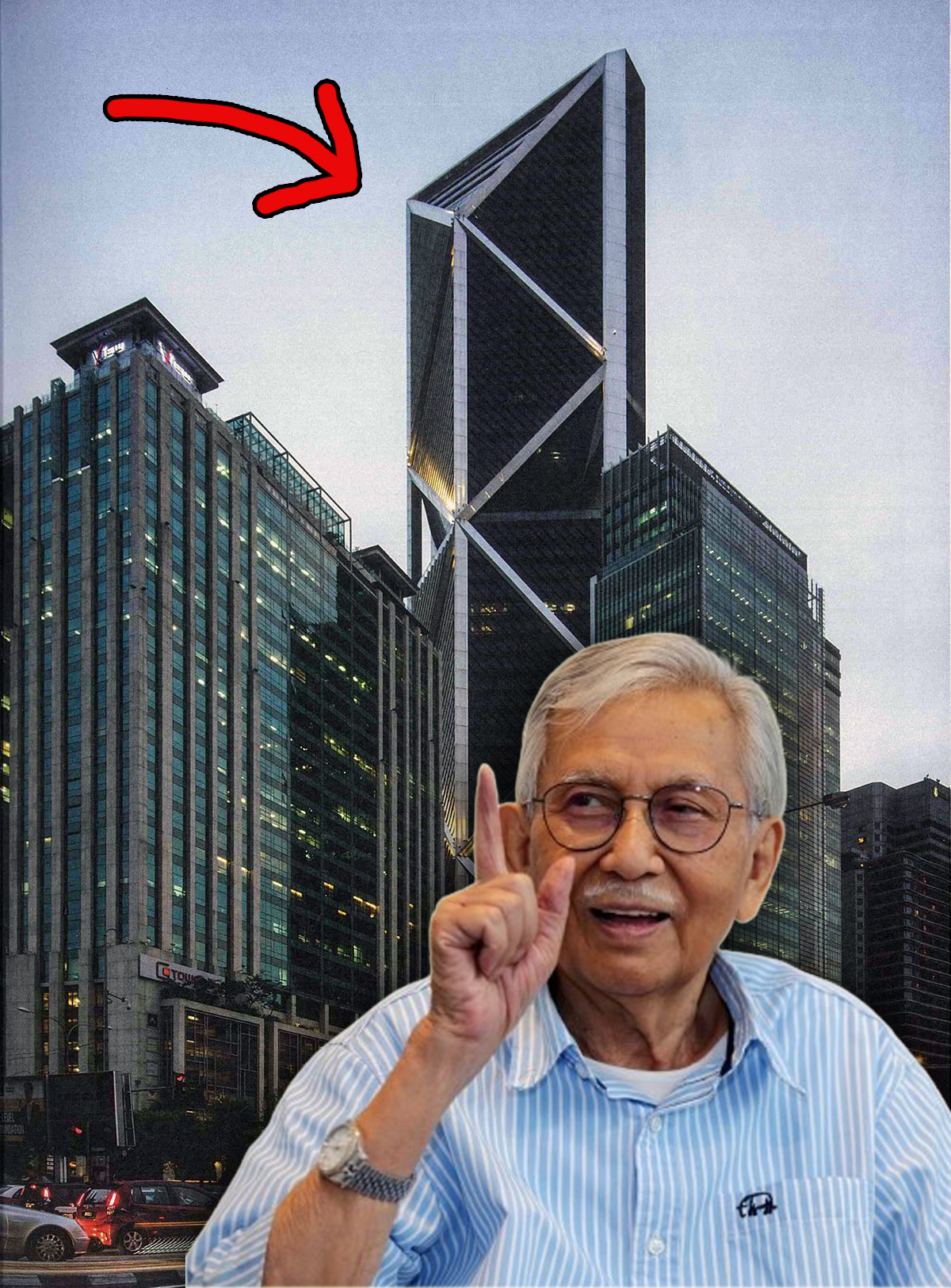
Though to be honest, unless you’re knee-deep in Malaysian politics, you probably wouldn’t have heard of him before. Surprise, surprise–he’s actually been a key figure in Malaysia’s development for over 40 years. And now the question–how did that happen? How did a heavyweight in Malaysian politics find himself in the hot seat with MACC? Well, to answer that, we kind of have to go all the way back to the beginning.
The 1960s – 70s: When Daim swapped his attorney hat for that of a businessman
Hailing from lil’ old Kedah, Tun Daim dedicated a good chunk of his early years to his law career. A stint in Allen & Gledhill marked his first foray into politics, where he was part of the team that navigated the 1966 Sarawak constitutional crisis. His work was so impressive that then-PM, Tun Abdul Razak, personally offered him a spot in the government which he refused.
“Impressed by his legal skills and political knowledge, the Prime Minister offered Daim a seat in Sungai Petani in the 1974 general elections but Daim declined, choosing instead to establish his credentials in business,” –excerpt from Tun Daim’s archived profile
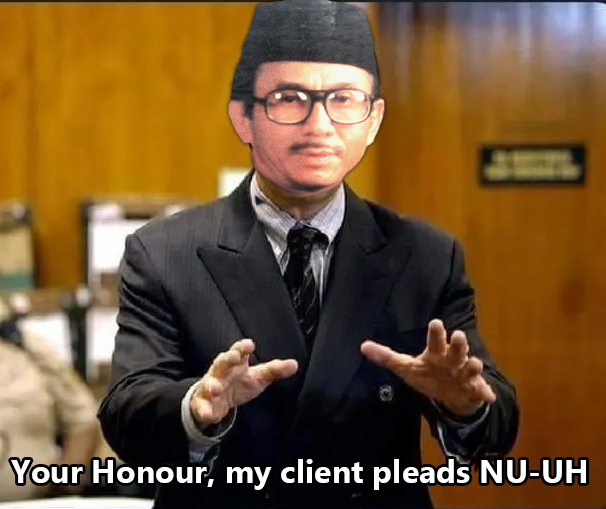
By the early 70s, Tun Daim left the courtroom to take on the business world. While his ventures in salt and plastic productions struck a roadblock, the real estate sector was where he really hit his stride. Through a company in which he had majority stake, Syarikat Maluri Sdn Bhd, he snagged prime land on the outskirts of KL and developed what is now called Taman Maluri.
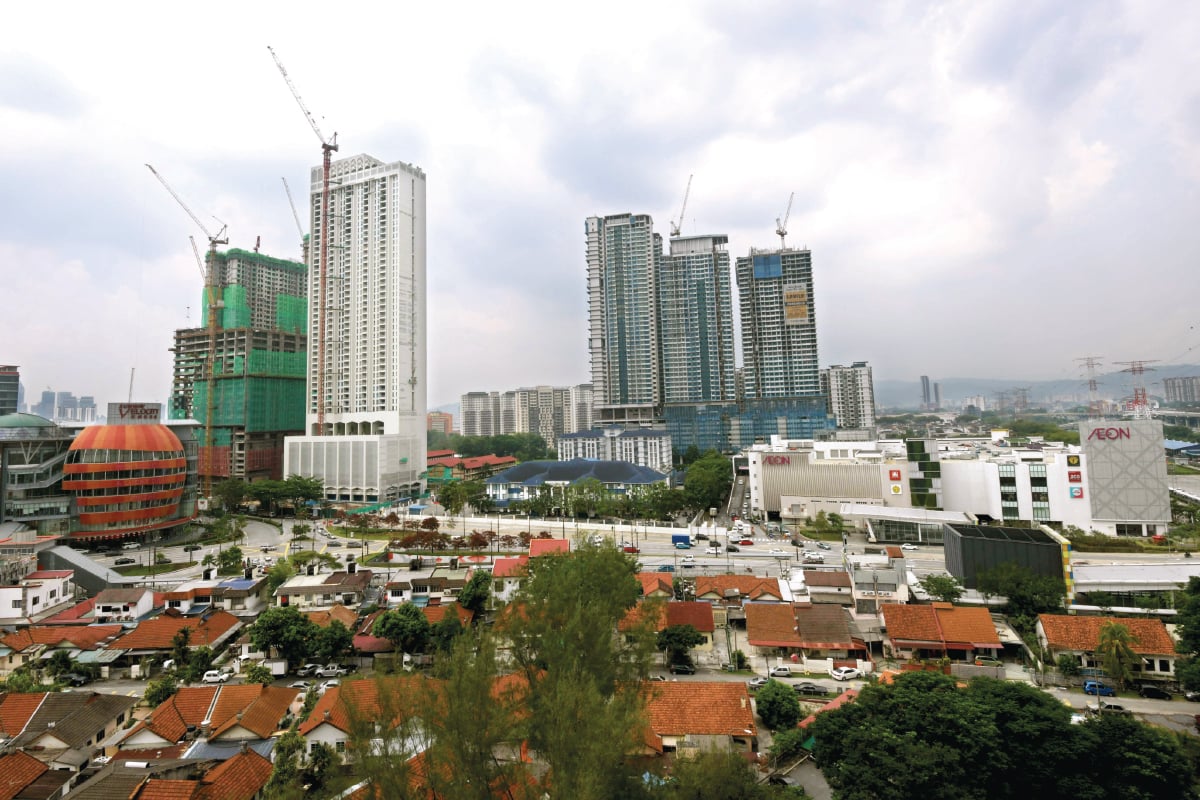
The success of this project coincided with the introduction of the New Economic Policy, which instated a lot of pro-Bumiputera programs. As one of the few Malay property developers in the business, Tun Daim essentially struck gold. The opportunities were pretty much falling into this lap, which makes sense since there wasn’t much competition to begin with.
With his earnings, he dabbled in the stock market and grew his wealth, particularly through his stakes in banks. Reports indicate that when Tun Daim officially took on his ministerial post, he had already amassed some M$600 million, an amount equivalent to about RM1.5 billion today. And as he made the leap into politics, Tun Daim had earned a reputation as a tycoon among his peers.
The 1980s : Daim and Mahathir’s friendship that shaped Malaysian economics
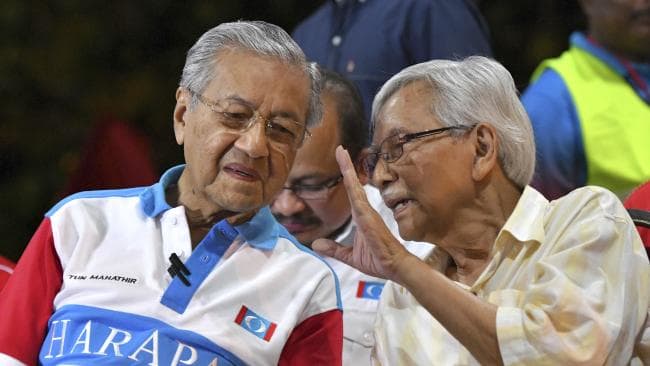
As Tun Daim climbed the business ladder, so did Mahathir within the ranks of UMNO. Some say it was around this time that they struck a friendship. What’s more, Tun Daim’s knack for getting things done didn’t escape Mahathir’s notice. When Mahathir first became PM, he sent Tun Daim to the US to tackle a tin stockpiling issue. Tun Daim’s triumphant return marked the beginning of his fairy-tale ascent to the top.
In 1982, he ran for the Kuala Muda parliamentary seat and won. About two years later, he was serving as Malaysia’s Finance Minister, effectively making him the third most powerful man in the country (after the PM and DPM).
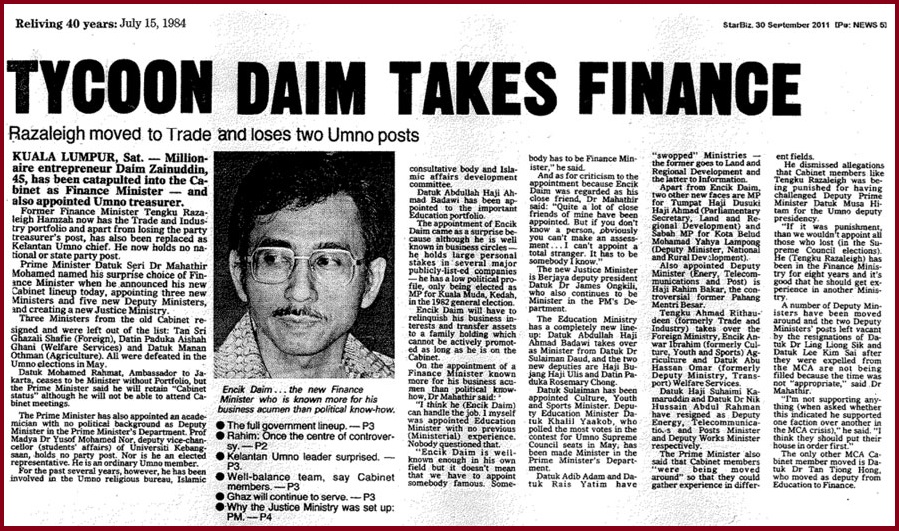
But that wasn’t just an empty title. The 1980s were marked by severe recession and Malaysia was equally in shambles, mostly due to inefficient governing. Tun Daim not only got things back on track but was working off the national debt ahead of schedule.
At the same time, one of the initiatives he spearheaded under Mahathir’s leadership was to “increase Bumiputera participation in the economy“. And he did this by directing substantial business opportunities to a select group of people, allegedly dubbed “Daim’s Boys“.
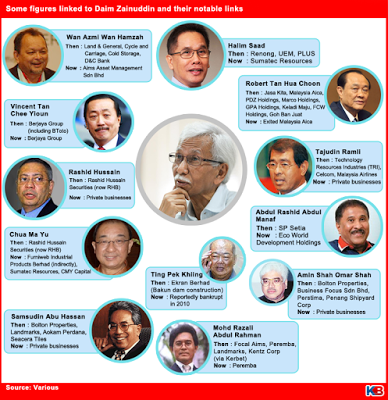
Just to be clear, these “boys” were handpicked individuals who were answering to Tun Daim’s beck and call. And he rewarded them by way of major infrastructure projects and high-ranking positions. But whether or not they earned those positions or projects, is a different matter entirely. It was said that their influence was so great, that Tun Daim and his buddies were basically running the Malaysian economy.
“Collectively, the business activities of Daim’s known associates encompass nearly all of Malaysia’s key economic sectors,” –excerpt from Kinibiz
The 1990s : Daim and Mahathir’s dramatic fallout with Anwar
The 90s commenced with Tun Daim stepping down from the role of Finance Minister, paving the way for none other than Anwar to take his place. But Tun Daim wasn’t out of the game just yet. Behind the scenes, he continued as an advisor to Mahathir and assumed the role of executive director at the National Economic Action Council.
But things took a turn when the 1997 Asian Financial Crisis hit. Within government meeting rooms, tension was brewing between Anwar and Mahathir. The issue? The direction of our country’s economic policies. Essentially, Anwar wanted to enforce a strict International Monetary Fund (IMF)-style approach which involved severe budget cuts. Meanwhile, the Mahathir-Daim duo were all about spending money to boost the economy.
“Mr. Anwar has often sided publicly with the austere measures recommended by the IMF, and has tended, on such key issues as bank lending policy, to favor high interest rates. Mr. Daim is seen as more sympathetic to the plight of companies squeezed by the economic crisis. He has in recent weeks criticized banks for keeping interest rates high,” –excerpt from the The New York Times

Long story short, Anwar refused to back down. So what did Mahathir do? He brought in Tun Daim to co-steer the ship. In 1998, Mahathir gave Tun Daim a special position as Minister for Economic Development. Needless to say, it totally sidelined Anwar, especially when Tun Daim proceeded to overturn almost all of Anwar’s earlier policies. Then with Anwar’s dismissal and imprisonment, Tun Daim simply glided back into his role as Finance Minister.
Some might say that Tun Daim was simply following Mahathir’s orders, but Anwar’s subsequent trial exposed some serious rifts between him and Tun Daim. Mainly, it was about the latter’s involvement in numerous government projects and just how much he, Mahathir and their cronies were pocketing. According to Anwar, his opposition to this was the reason Tun Daim and Mahathir wanted him out.
The financial crisis spilled over into the early 2000s. During that time, our neighbouring countries (Thailand, Indonesia and far neighbour South Korea) turned to the IMF for help. Malaysia famously refused, choosing instead to peg our Ringgit to the US dollar.
“Malaysia, with Daim as the driving force, introduced the ringgit peg in 1998, along with capital controls, to stave off the Asian currency crisis.” –excerpt from CNN

It was a risky move and one that faced heavy criticism because we were basically handcuffing our country to the US. But lo and behold, it worked. Once more, Tun Daim managed to drag Malaysia back from the brink of collapse.
Behind closed doors though, it was widely believed that the reason Tun Daim and Mahathir turned down the IMF’s help was because they feared it would lead to stricter economic regulation (read: transparency and efficiency). And that would mean no more government contracts, subsidies, nor exclusive business perks for their inner circle.
In any case, Tun Daim didn’t stay in his position for long. In just 3 years, he resigned again.
The 2010s : Daim’s sudden resurgence (ft. Mahathir)
For the most part, Tun Daim kept a low profile after he left the government. Perhaps the most we heard of his name was while strolling through the supermarket aisles.

But all that changed when the 2018 Elections happened. As you guys know, Pakatan Harapan won, thrusting our on-again-off-again trio–Mahathir, Anwar and Tun Daim–back into the spotlight.
As soon as Mahathir was elected PM, he appointed then 80-year-old Tun Daim as chief of the Council of Eminent Persons. This was a five member council, which included the likes of Zeti Aziz, the former Bank Negara governor and Robert Kuok, the billionaire tycoon. They were called together to advise the new government on issues regarding the economy.
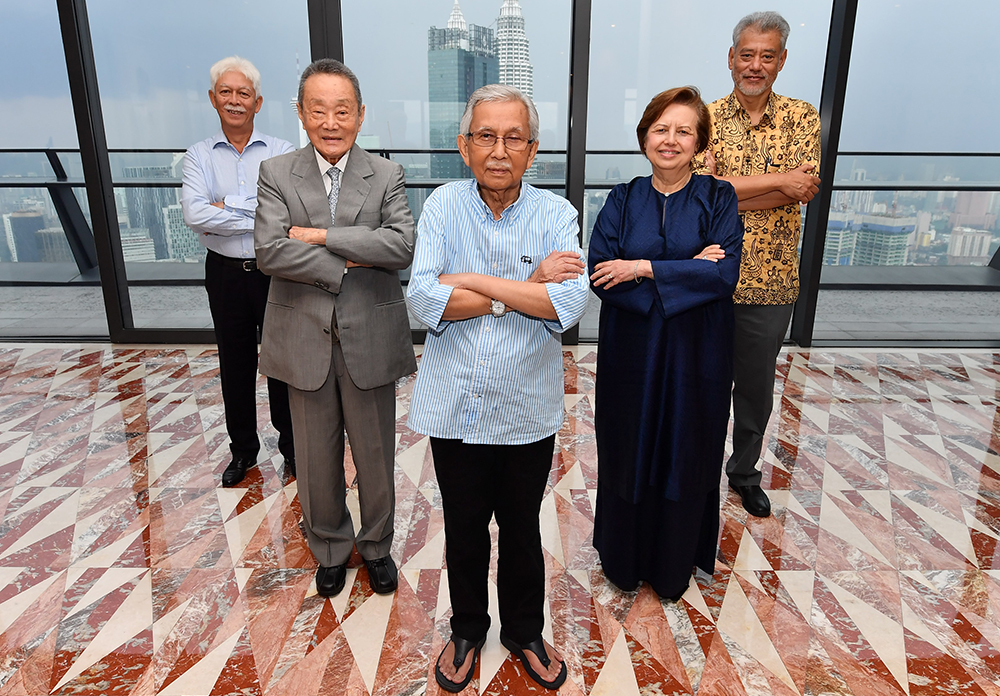
And while he was back in office, Tun Daim and Anwar picked up right where they left of. At times they were at each others’ throats…
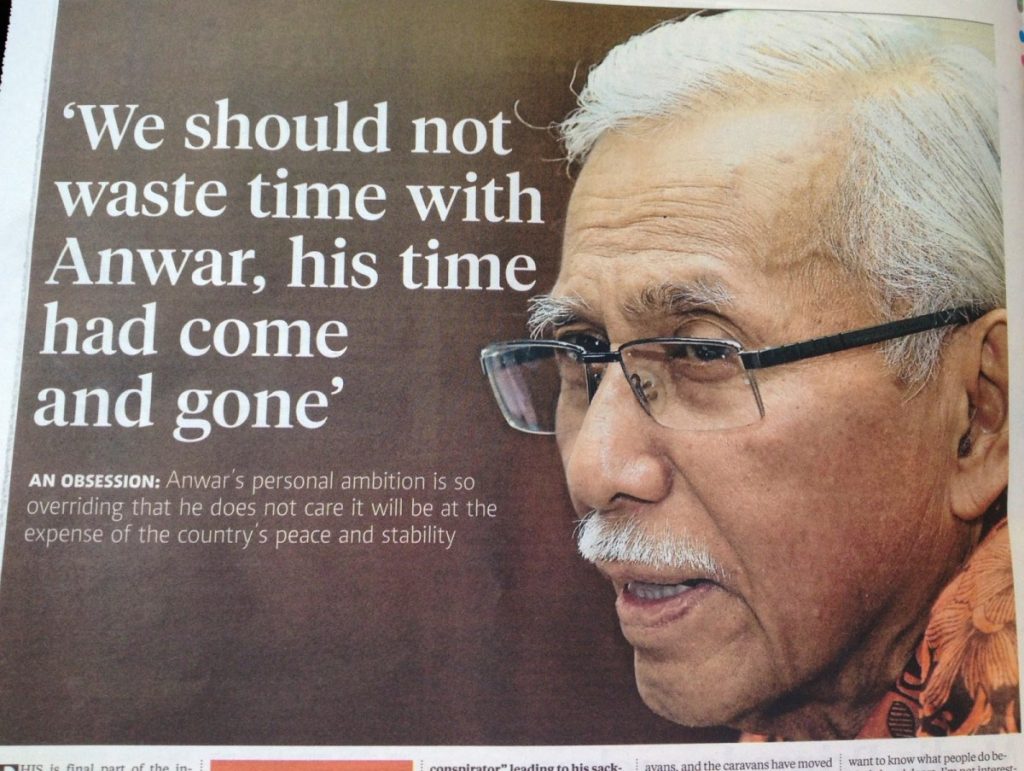
And at times they almost seemed like besties…

As friendly as they looked though, Anwar once said, “Daim will have sleepless nights if I am PM“. Well then, whatever could he mean by that?
The 2020s: The controversy that shut the doors of Ilham Tower
So far, MACC has been pretty mum on the exact charges Tun Daim is facing. In May 2023, they were investigating a Tan Sri and a former senior minister for allegedly misappropriating over RM2.3 billion in national funds. Fast forward to June 2023, they had asked Tun Daim to declare his assets, which he kept pushing off. And that culminated in his tower being seized and his family being called in for questioning. But wait–his family?
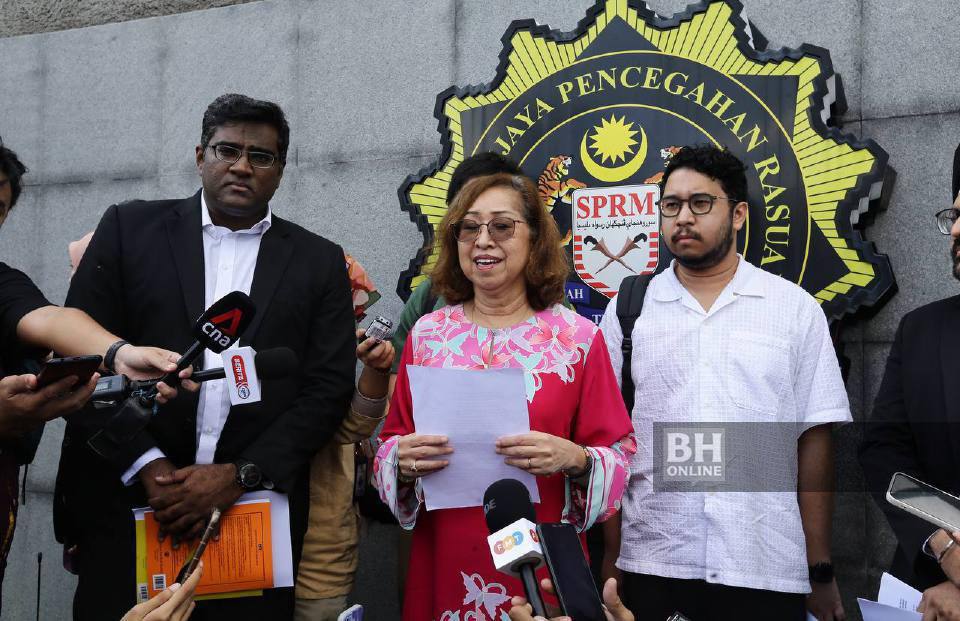
So it turns out, Tun Daim’s wife and two sons are linked to several offshore companies, most of which are located in Britain. Tun Daim himself is linked to 5, and interestingly, all 5 have ties to Asiaciti Trust, an international finance company. Now this company is known for partnering with the world’s wealthiest bigshots who have a history of tax evasion, corruption and money laundering. In Malaysia, it’s not illegal to own offshore accounts, but it is illegal if it’s used for all those reasons.
But while MACC has been keeping things under wraps, Channel News Asia has connected this whole saga to a 1997 event: a corporate deal between UEM and Renong valued at–would you believe it–RM2.3 billion.
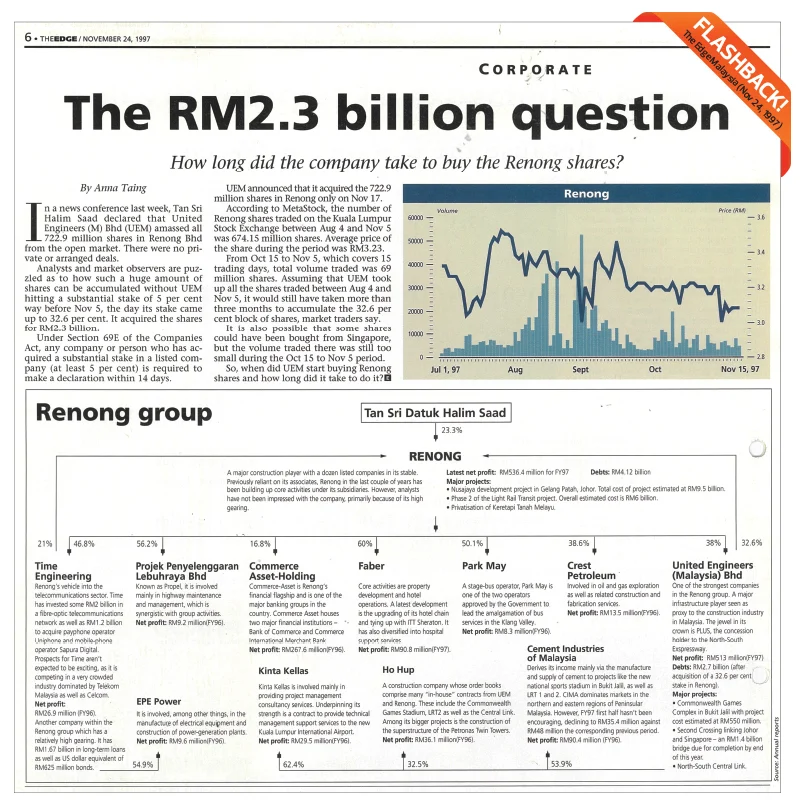
Back in the day, UEM was an UMNO linked company, and under Tun Daim’s first tenure as Finance Minister, they reaped a lot of lucrative government projects. It just so happened that Renong, which was the parent company of UEM, fell into the hands of Halim Saad. And just who is this guy? Well, if you guessed one of “Daim’s boys”, you’re absolutely correct.

All was well and good for Renong and its many subsidiaries until the 1997 Asian Financial Crisis hit. The stock market crash, the company’s value plunged and they suddenly found themselves in severe debt. And then it was revealed, that the uber rich UEM had suddenly acquired a 32% stake in Renong, bought at a price way more than the listed value. The overall total spent? RM 2.3 billion.
According to Malaysiakini,
“The deal was widely seen as a bailout for Renong and Halim, and analysts were sceptical of the claim that the shares were bought on the open market because, according to the International Herald Tribune, the amount of shares involved was equivalent to four months of trading.”
The aftermath saw UEM and Renong taken over by Khazanah Nasional in 2001. And to this day, it’s believed that Tun Daim was the mastermind behind the UEM-Renong deal.
Now, we know that’s a lot to swallow, what with all the corporate jargon, percentages and random names floating around. So here’s another way to understand the severity of the UEM-Renong scandal: Imagine if the PM’s son is in really bad debt, and suddenly the PM is like, no worries son, let’s just have the government buy your old beat-up car that’s worth RM 5k for RM 5 million. And voila! Thanks to good old dad, the debt is gone and the son’s even got some extra cash to waste away. 😊✌🏻
At any rate, it’s now all in the hands of the authorities to investigate. In a recent public address though, Tun Daim’s wife made a rather interesting accusation, suggesting that the corruption charges stem from Anwar’s personal vendetta against her husband. And that got us thinking…
What are Anwar’s true intentions in this story?
As you may have very well noticed, ever since Anwar has become PM, we’ve had a bunch of politicians–like Muhyiddin, Wan Saiful Wan Jan, and Syed Saddiq–battling it out in court against corruption charges. And while Anwar has always made clear that he has a zero-tolerance policy against corruption, one can’t help but wonder if he’s also singling out people he’s had beef with.

In a letter penned from prison, Anwar had accused both Mahathir and Tun Daim of plotting his downfall. And now that he’s in the seat of power, we’re seeing a lot of action being initiated. Some speculate that Mahathir might be next on Anwar’s list. And while it’s gratifying to witness accountability in action, it’s also worth noting that corruption cases within Anwar’s circle have seen charges dropped.
So where does that leave us? Well, Tun Daim allegedly had his cronies and filled up their wallets. Anwar too appears to shield those close to him despite their alleged wrongdoings. At the end of the day, maybe instead of rivals, what if they’re really just 2 chill peas hanging together in the same pod…?
- 295Shares
- Facebook204
- Twitter13
- LinkedIn13
- Email10
- WhatsApp55

